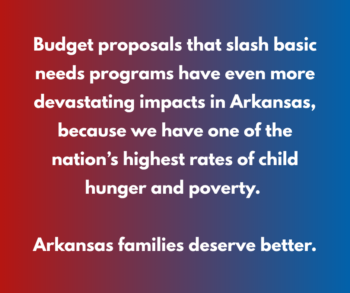
Here’s what’s happening
Congress is considering legislation this month (June 2025) that will worsen hunger and strip health care coverage from millions of families — to partially offset trillions in tax cuts. The proposed budget reconciliation bill, now in the U.S. Senate, includes the largest cuts to Medicaid and the Supplemental Nutrition Assistance Program in history and takes away food assistance and health coverage from lawfully present immigrants.
The legislation increases costs for low-income Arkansans by taking away health care coverage and the SNAP benefits they use to buy food for their kids; increasing the cost of electricity; and making college less affordable. It is an attempt to undermine the Affordable Care Act and Medicaid, which have saved countless lives by expanding health care coverage and making it less expensive.
For more than half a century, the federal government has been committed to cutting poverty, but this bill abandons our shared vision of creating a country in which everyone has a fair shot at opportunity. At Arkansas Advocates, we hope senators stand up for Arkansans and demonstrate a real commitment to help struggling people in this country by rejecting this reckless plan.
Here’s how you can get involved
Want to help us stop this bill? You can take action here to let your Members of Congress know you want them to protect Medicaid and SNAP.
Here’s more information about the state-level impact of this legislation
- As many as 177,000 Arkansans could lose their Medicaid coverage under harsh new work requirements.
- It would force our state to pick up the tab for 20% of the SNAP program, or about $110 million. This could risk the program altogether, because Arkansas could choose not to share these costs and just opt out of the program. This would raise the cost of groceries for 240,000 Arkansans enrolled in the program.
- It fails to continue enhanced premium tax credits that help tens of thousands of Arkansans afford private health insurance. Another 49,000 Arkansans could lose health coverage altogether due to high premium costs.
- It takes away eligibility for health coverage and SNAP from immigrants without lawful permanent residency, or green card, status. This could take food and health care access from Arkansas’s Marshallese community, who have long been lawfully residing in our state but only recently became eligible.
- It would significantly expand SNAP’s already harsh work requirements, requiring parents of school-age children to meet red-tape laden requirements even in summer when their children are not in school. This would jeopardize SNAP eligibility for 60,000 Arkansans.
- It penalizes Arkansas unless it stops providing comprehensive coverage to lawfully residing immigrant children and pregnant women. If the bill passes and Arkansas continues providing coverage to these lawful immigrants and migrants, our state would lose a favorable federal match rate for the Medicaid expansion (coverage for low-income adults). This would trigger a state law that would end the expansion, likely forcing the state to end coverage for immigrant children and pregnant women.
- It would increase energy prices while cutting jobs. It cuts more than $500 billion from clean energy tax credits, threatening two-thirds of planned projects nationwide. In Arkansas, that could lead to energy prices going up by more than 9% while our state loses 4,500 in clean-energy jobs.
- It makes college less affordable with changes to Pell Grant eligibility rules. This could result in 13,400 low- and middle-income Arkansas students losing all federal aid and another 29,200 students losing some aid.
- At the same time, the much-touted tax cuts are skewed. It gives Arkansans with the top 1% in income (those earning more than $668,900 a year) an annual tax cut of $50,350. Meanwhile, the lowest-income families in our state (those earning less than $24,600) would receive just $70. Many would also lose Medicaid and SNAP, resulting in a loss.
- While the bill would increase the Child Tax Credit from $2,000 to $2,500 per child, only higher-income families would be able to take the full credit. Those who work but don’t earn as much wouldn’t be able to take the full credit. As many as 243,000 children in Arkansas are in families who would be denied the full credit.
Here’s how to get updates from us
We’ll keep you up to date on the latest. Sign up for action e-list here, and follow us on Facebook and Instagram.
